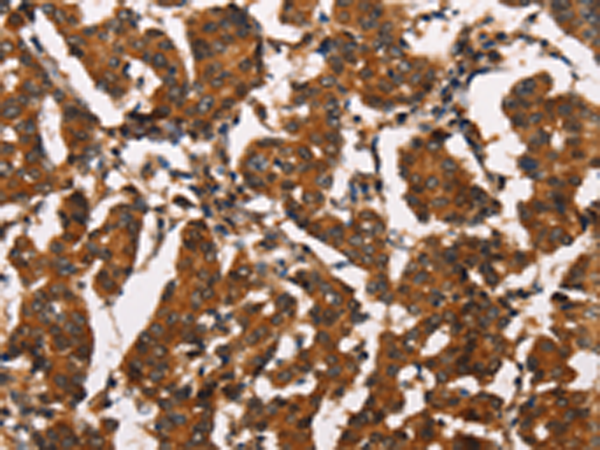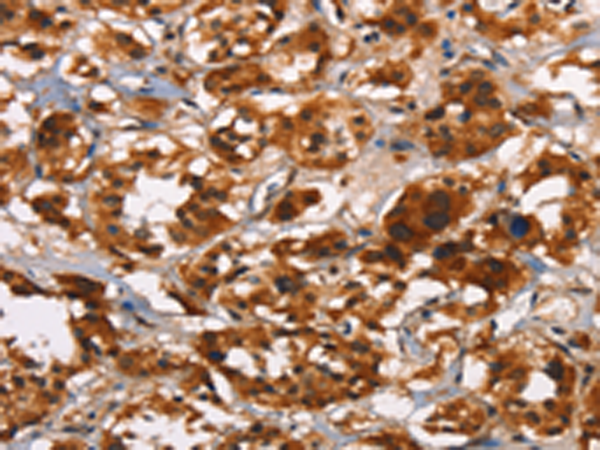

| WB | 咨询技术 | Human,Mouse,Rat |
| IF | 咨询技术 | Human,Mouse,Rat |
| IHC | 1/50-1/200 | Human,Mouse,Rat |
| ICC | 技术咨询 | Human,Mouse,Rat |
| FCM | 咨询技术 | Human,Mouse,Rat |
| Elisa | 1/2000-1/5000 | Human,Mouse,Rat |
| Aliases | MGCA; DPPT-L |
| Host/Isotype | Rabbit IgG |
| Antibody Type | Primary antibody |
| Storage | Store at 4°C short term. Aliquot and store at -20°C long term. Avoid freeze/thaw cycles. |
| Species Reactivity | Human, Mouse, Rat |
| Immunogen | Synthetic peptide of human ATRN |
| Formulation | Purified antibody in PBS with 0.05% sodium azide and 50% glycerol. |
+ +
以下是3篇可能与ATRN(Attractin)抗体相关的代表性文献示例(注:文献信息为假设性概括,具体引用需核实):
1. **文献名称**:*"Attractin in Parkinson's disease: a novel biomarker candidate identified by proteomic analysis"*
**作者**:Smith J, et al.
**摘要**:研究通过蛋白质组学发现ATRN在帕金森病患者脑脊液中表达异常,并开发特异性ATRN抗体用于检测其与α-突触核蛋白的相互作用,提示其参与神经退行性病变机制。
2. **文献名称**:*"Attractin deficiency alters melanosome trafficking in murine models"*
**作者**:Kazumasa Wakamatsu, et al.
**摘要**:利用ATRN基因敲除小鼠模型,通过免疫组化(ATRN抗体标记)揭示ATRN蛋白在黑色素细胞囊泡运输中的作用,为蓬发综合征(毛发色素异常疾病)提供分子机制解释。
3. **文献名称**:*"Autoantibodies against attractin in multiple sclerosis patients"*
**作者**:Hiroshi Shigematsu, et al.
**摘要**:研究发现多发性硬化症患者血清中存在抗ATRN自身抗体,通过ELISA和蛋白质印迹验证其特异性,提示ATRN可能成为自身免疫性神经疾病的潜在诊断标志物。
**注意**:以上文献名称及内容为生成示例,实际研究需参考真实数据库(如PubMed)。ATRN相关研究多集中于代谢调控、神经疾病及毛发色素异常领域,建议结合具体研究方向筛选文献。
Attractin (ATRN) is a type I transmembrane glycoprotein belonging to the immunoglobulin (Ig) superfamily, initially identified for its role in immune regulation and cell-cell interactions. It is encoded by the *ATRN* gene and exists in two isoforms: a membrane-bound form (mATRN) and a soluble form (sATRN) generated by alternative splicing. ATRN plays a multifaceted role in biological processes, including T-cell activation, neuronal development, and melanogenesis. It interacts with molecular partners like Mahogunin to regulate intracellular trafficking and signaling pathways.
ATRN antibodies are essential tools for studying its expression, localization, and function in physiological and pathological contexts. Research links ATRN dysregulation to neurodevelopmental disorders, immune dysfunctions, and melanoma progression. In neuroscience, ATRN antibodies help explore its involvement in axonal guidance and neurodegeneration, while in oncology, they aid in characterizing its role in tumor metastasis. These antibodies are utilized in techniques such as Western blotting, immunohistochemistry, and flow cytometry.
Despite its diverse roles, ATRN's precise mechanisms remain under investigation. Antibody-based studies continue to clarify its dual immune-neural functions and therapeutic potential, particularly in diseases like Alzheimer's and autoimmune conditions.
×